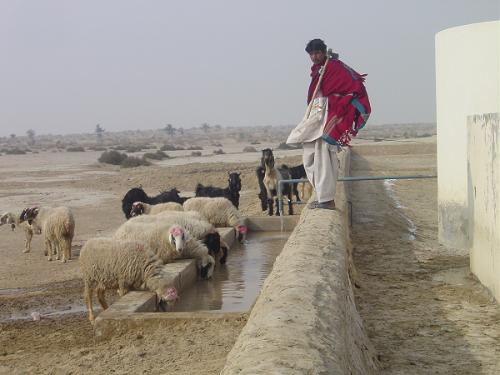ISSUE 41: MARCH-MAY 2006
network of research and training centres/programmes
FRONT PAGE | ARCHIVE |
Water innovations on show at SUMAMAD workshop
Modern solar-powered techniques to desalinate water for the desert-dwelling Bedouin of Egypt and an initiative to harness floodwaters to recharge depleted Iranian aquifers were among many innovations showcased at an international workshop on Sustainable Management of Marginal Drylands (SUMAMAD), co-organized by UNU International Network on Water, Environment and Health (UNU-INWEH).
 |
|
A SUMAMAD project site providing safe water in Pakistan's Cholistan Desert. |
Held in Islamabad, Pakistan, the workshop reviewed SUMAMAD project achievements.
Farmers, pastoralists and scientists at eight study sites in marginal dryland areas
of North Africa and Western Asia are engaged in research, training and capacity building efforts, and information management.
Some 80 workshop participants from eight countries discussed traditional and innovative approaches to water resource management, rangeland rehabilitation and management, and sustainable cultivation of crops, trees and livestock in dryland areas.
Of particular note was the ‘Aquitopia’ cooperative, created by Iranian farmers and scientists to recharge depleted groundwater reserves by harnessing floodwaters. The project leader was recently
honoured with an international prize for this innovative aquifer recharge approach.
Alternative livelihoods are also being promoted to further reduce pressures caused by over-dependence on natural resources. Successful examples include development of ecotourism facilities in Tunisia at a former settlement of troglodytes (a prehistoric race that lived in caves), processing of traditional Mongolian milk tofu products in Northern China, aquaculture farming using saline water in the Cholistan desert in Pakistan, and restoration of organic market gardening activities and production of a high quality soap made from olive oil in Jordan.
SUMAMAD is a joint initiative of UNESCO (through its Man and the Biosphere and International Hydrological Programme), United Nations University and the International Centre for Agricultural Research in Dry Areas (ICARDA). It is supported by the Government of Flanders, The Netherlands. UNU-INWEH is implementing projects funded by UNESCO under an agreement that began in 2005, and recently renewed for 2006.
Click here for a full workshop report and more information about the SUMAMAD project.
© 2006 United Nations University